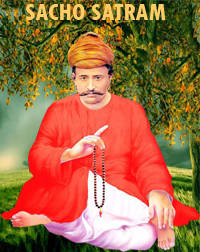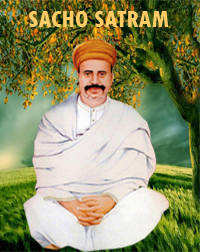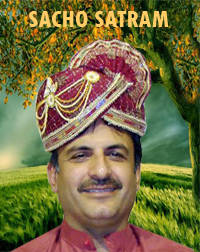At the auspicious dawn of the New Year 2025, Hazir Swaroop Sai Sadhram Saheb illuminated the significance of cherishing every microsecond and millisecond of time.
Saijan explained that as we eagerly await the arrival of the New Year, we pay close attention to each passing second on the clock. Every second holds our focus as we anticipate the moment when the clock strikes 00:00, symbolising the end of the old year and the beginning of the new one.
Interestingly, everyone feels a surge of excitement, attraction, desire, and anticipation for that one magnetic moment that ushers in the New Year.
The difference and distance between each passing second are profound. Within one second, one person may attain the luxuries of a king, while another may face hardships greater than those of a pauper
Many people believe that two children born at the same time share the same fate and destiny. However, this is not the case, as even the slightest difference of a millisecond or microsecond can alter their destinies.
Each millisecond and microsecond, influenced by the planets and their transitory movements through the zodiac signs, shapes a person’s thoughts, understanding, behaviour, and more.”
All of this underscores the significance of time.
How do we spend our time?
How should we make the best use of it?
God has blessed us with abundant comforts, but how we utilise this precious gift of time is of utmost importance. The first step is to recognise and value the time we have been given.
Time, in turn, values us when we respect and use it wisely.
When we make wise use of our time and appreciate its worth, time rewards us by allowing us more opportunities to continue our good work.
However, if we fail to use time wisely, it diminishes and may eventually cease to support us.”
Those who dedicated their time to Nem, Dhyan, Simran, and performing good deeds enhanced their lives and contributed to their betterment. Such individuals are blessed with more time to continue their virtuous efforts.
On the other hand, those who were granted ample time but failed to use it wisely—neglecting its value, disregarding life’s purpose, and not engaging in good practices—ultimately face challenges. Time does not extend its grace to those who squander it and fail to recognise its significance.
Hazir Swaroop Sai Sadhram Saheb emphasised the importance of valuing every moment and every second of time.
With each passing second, the next one follows, and with every minute, the next minute comes. Hours change and repeat every 60 minutes, throughout the year—except when the year itself changes, as 2024 transforms into 2025. Each changing moment, second, minute, hour, day, week, and month serves as a reminder to pay attention to the passing of valuable time, and yet, time continues to offer us opportunities to improve our lives.
Every year, when we blow out a candle on our birthday, it serves as a reminder that one more year of our life has passed. The year changes, but if we do not change and grow for the better, there is no true reason to celebrate.
We should reflect on how we spent our time in the past year—how much progress we made, how much we improved ourselves, and how much better character we developed.
Saijan mentioned that when someone offers us tea or coffee, even without much insistence, we remember their kindness and feel inclined to return the favor, showing our gratitude. However, we seldom apply this same reflection to our own lives and the quality of the time we’ve spent living them.
Life grants us ample time, along with health and wealth, so that we can live meaningfully, yet we often waste this precious time. We fail to appreciate the blessings we have and misuse the resources entrusted to us.
While we celebrate the arrival of the new year, we often forget to show gratitude for the year that has passed and all that it has offered us.
Showing gratitude or being thankful means reflecting on how we gracefully handled our lives—the good deeds we performed, the time we spent in remembrance of God, practising meditation, helping and uplifting others, caring for those around us, the progress we made, and the respectful way we utilised the resources life has provided us.
Saijan shared an example: when an officer is transferred from a department, the officer leaving informs the incoming officer about the surrounding circumstances, the types of people—both good and bad—with whom they will have to interact, and other relevant details. Similarly, the passing year leaves behind signals and indications about the kind of people it has dealt with.
The new year moves forward, carrying the imprints left by the year that has passed.
Saijan reminded us to live our lives with care and full conscious awareness, valuing every millisecond and microsecond. When we account for our deeds, we should do so with confidence, knowing that the good actions of the past year will guide our progress in the new year.
Entering the new year means stepping into new fortune and new destiny. And both destiny and fortune unfold through action. The more good we do, the greater the benefits we will receive.
Hazir Swaroop Sai Sadhram Saheb emphasized that 2025 is a year of great fortune.
For example, when we add the digits of 2025:
2 + 0 + 2 + 5 = 9
The number 9 is associated with completeness and holds deep spiritual and cosmic significance in our Dharma.
Let’s see the symbolism of 9 through multiplication:
9 × 1 = 9
9 × 2 = 18 (1 + 8 = 9)
9 × 3 = 27 (2 + 7 = 9)
9 × 4 = 36 (3 + 6 = 9)
9 × 5 = 45 (4 + 5 = 9)
9 × 6 = 54 (5 + 4 = 9)
9 × 7 = 63 (6 + 3 = 9)
9 × 8 = 72 (7 + 2 = 9)
9 × 9 = 81 (8 + 1 = 9)
9 × 10 = 90 (9 + 0 = 9)
This year, 2025, has arrived with its completeness
Each year, we must strive to improve and progress for our own betterment.
In truth, we are born to enhance ourselves and to thrive.
This human birth is a result of the progress we made in our previous lives, and in this life, our purpose is to continue prospering and evolving
Saijan shared an example of a doctor from the USA who, he explained, treats people by taking them back to their previous births. The doctor believes that the root cause of a person’s illness can often be traced to their past lives. According to the doctor, certain actions from a person’s previous births may be the source of the ailments they are suffering from in the present.
Saijan also shared another example of a late Pundit Ji, who cured a girl suffering from severe headaches.
The girl’s parents told Saijan that they had consulted numerous doctors and health professionals, but all efforts were in vain. Then they heard about a Pundit Ji, known for performing miraculous cures, and decided to seek his help.
When the parents met Pundit Ji, they explained that their daughter experienced sudden, intense headaches and asked for his guidance. Pundit Ji immediately understood the cause of the girl’s suffering. He instructed the parents to visit a specific location where they would find a river, and near it, a deer’s skull hanging from a tree. He told them to remove the skull, perform certain rituals, and then place the skull in the river.
The parents followed his instructions and were astonished to find the deer’s skull hanging from the tree. They took it down, performed the last rites along with the prescribed puja, and placed the skull in the river. To their amazement, their daughter’s headaches suddenly disappeared, and she became completely fine.
Curious, the parents asked Pundit Ji about the reason behind the entire ritual. Pundit Ji explained that in the girl’s previous life, she had been a deer who had fallen from a mountain. Her skull became stuck in a tree, while the rest of her body gradually fell into the river. Since the skull remained hanging, it would sway in the wind, and whenever it did, it caused the girl to experience intense headaches in her current life.
At this point, Saijan explained why, in our Dharma, we perform the last rites of a deceased person with great care. This is done to ensure that the departed soul’s journey in the afterlife is smooth, free from any obstacles or lingering effects from their previous life.
Saijan once again reminded the people about the doctor who took his patients back to their previous births to help cure their current ailments. The doctor discovered that, in each past life he visited with his patients, they would speak in the local language of the place where they had been born in a previous life.
During these sessions, the doctor also encountered souls who had not yet been reborn after their death. When he inquired if anyone nearby was from a place connected to his own, he was shocked to hear the souls mention that his deceased father and son had lived there. They even knew the cause of his son’s death.
This profound experience led the doctor to conduct further research into the concept of reincarnation.
When the doctor asked the souls why they are born again and again, they explained that God grants them repeated opportunities to improve, live a righteous life, and make progress, ultimately striving to attain freedom from the cycle of birth and death.
Saijan emphasised that we are given life to correct and improve ourselves. We should honor our life by making the best use of it. We must be thankful to Parmatma for blessing us with so many comforts and resources, and for granting us the opportunity to progress in human form. The human form is a precious gift, one that we should value and use to enhance our lives.
We should welcome the New Year by engaging in good deeds, so that we can be truly happy and grateful to Parmatma. When we stand before the great Lord, we should do so with confidence, not with guilt.
Saijan shared that he himself had visited his previous births, and that travelling to past lives is not a miracle, but rather a scientific technique.
He shared an incident about a doctor who took a king back to his previous births to understand the reason for his contented life in this birth. The doctor discovered that, in his 12th previous birth, the king had been a very poor man who struggled to even find food. One day, he gathered some discarded wheat grains and made three chapatis. As he sat down to eat, a hungry beggar approached him, asking for food. Despite having only three chapatis, the man gave all of them to the beggar, choosing to remain hungry. Due to this selfless act of kindness, Parmatma blessed him with a future birth as a king, so that he would never face hunger or lack and would always be content.
Saijan explained that this is why it is important for us to always strive to do good deeds and improve our lives in order to progress.
The man who gave his three rotis to the needy had cultivated the habit of helping others, and this generosity, carried through eleven previous births, led him to be born as a king in his 12th life. He became someone who had abundance in every aspect of his life, never lacking anything. This shows that his acts of generosity in each birth earned him the blessings to be born as a king.
Saijan emphasised that we must constantly strive to improve ourselves. Self-improvement requires:
– Self-discipline
– Self-control
– Self-tolerance
These qualities can be cultivated through practices like fasting, known as ‘vrat’ or ‘upvas’ in Hindi. Fasting helps us maintain discipline in our lifestyle and develop self-control. During fasting, we control our desire to eat and even consume things we might not typically like, all while practising tolerance.
We can also enhance our self-control and discipline by regularly setting aside our phones for an hour or more, especially during a program or puja. This simple act teaches us to refrain from distractions and focus on the present moment.
In today’s world, people are often too attached to their phones. By practising to disconnect from our phones for a few hours, we can connect with others in a more meaningful way and nurture stronger relationships.
Therefore, we should begin the New Year with self-discipline and self-control, allowing us to grow, develop, and thrive in a true sense.
Every second is precious, and we can truly understand its value by reflecting on that one second we focus on while waiting for the New Year to begin. We watch each passing second as we wait for the clock to strike 00:00, signalling the start of the celebrations. In that moment, we all realise the significance of every fleeting second.
Hazir Swaroop Sai Sadhram Saheb enlightened the people by pointing out that if one second can bring so much happiness, we can only imagine the immense joy, greatness, and progress we can achieve over the minutes, hours, weeks, months, and years we are blessed with in our lifetime.
What we truly need is to value our time.
Saijan suggested that every morning, upon waking, we should make it a habit to express our gratitude to God. We should say, ‘We are deeply thankful for the new day, the new light, and the new hope you have blessed us with,’ and pray for the merciful God to continue guiding us with divine light and granting us a better day.
By respecting and valuing every second of our life, we lay the foundation for a great future. We can start each year with mindfulness in our hearts, enabling us to progress and prosper in our live.



